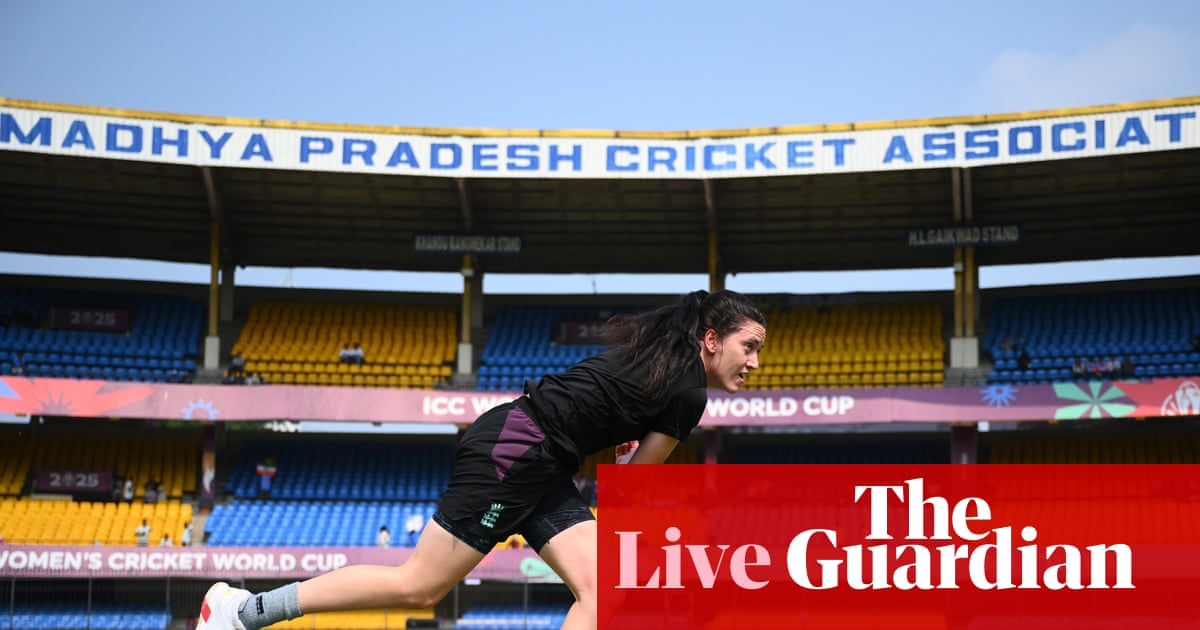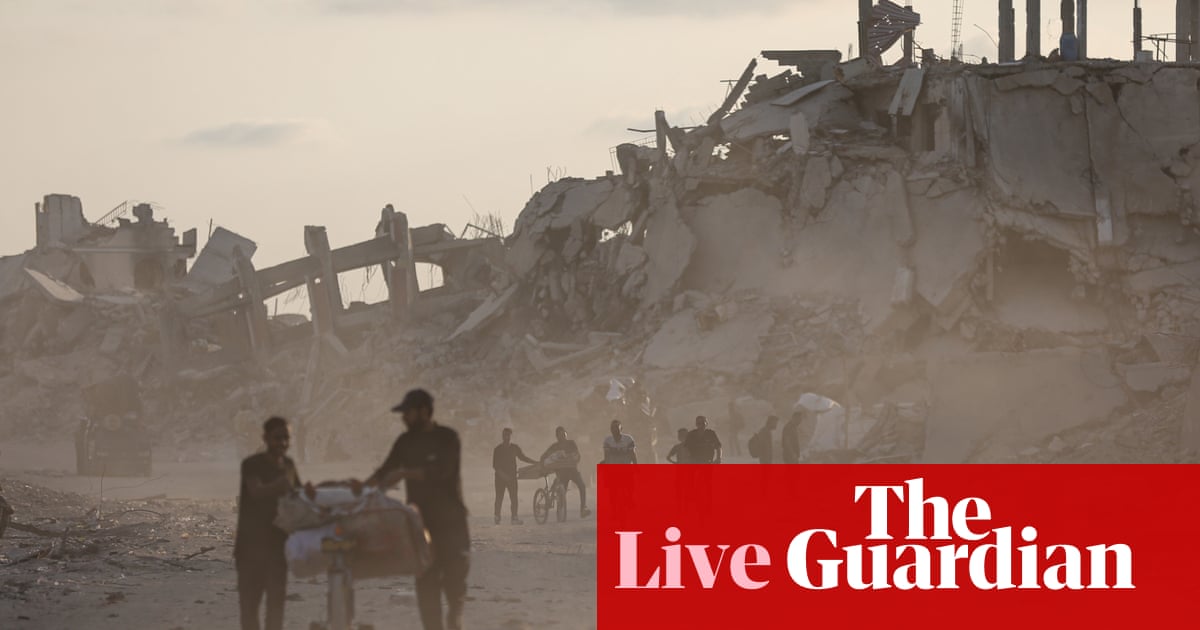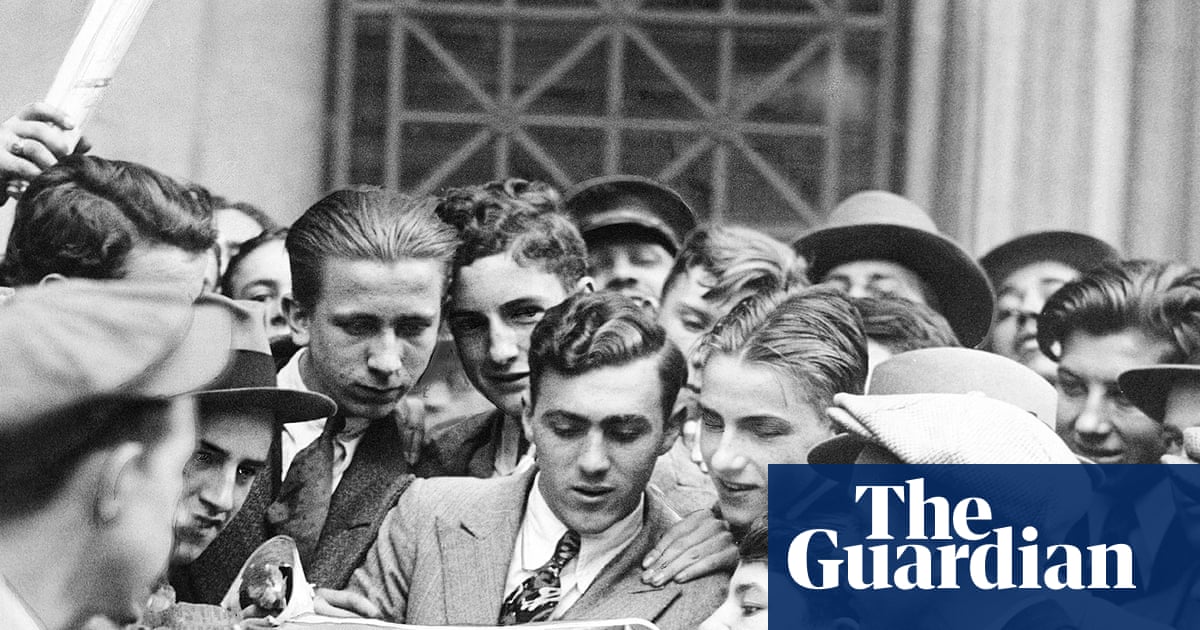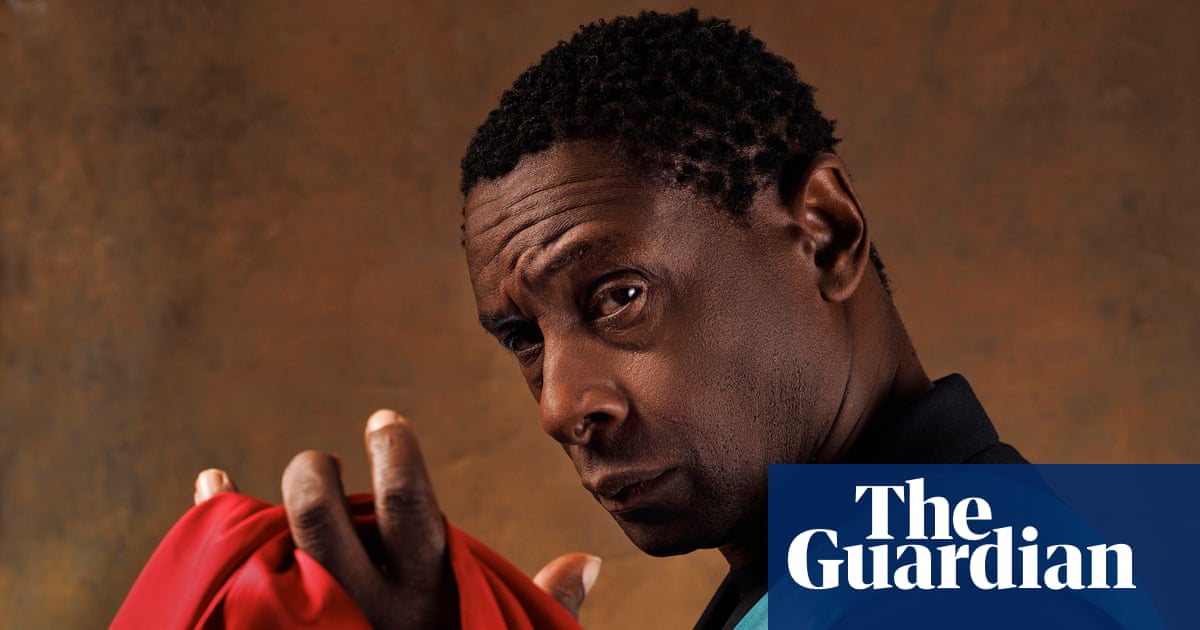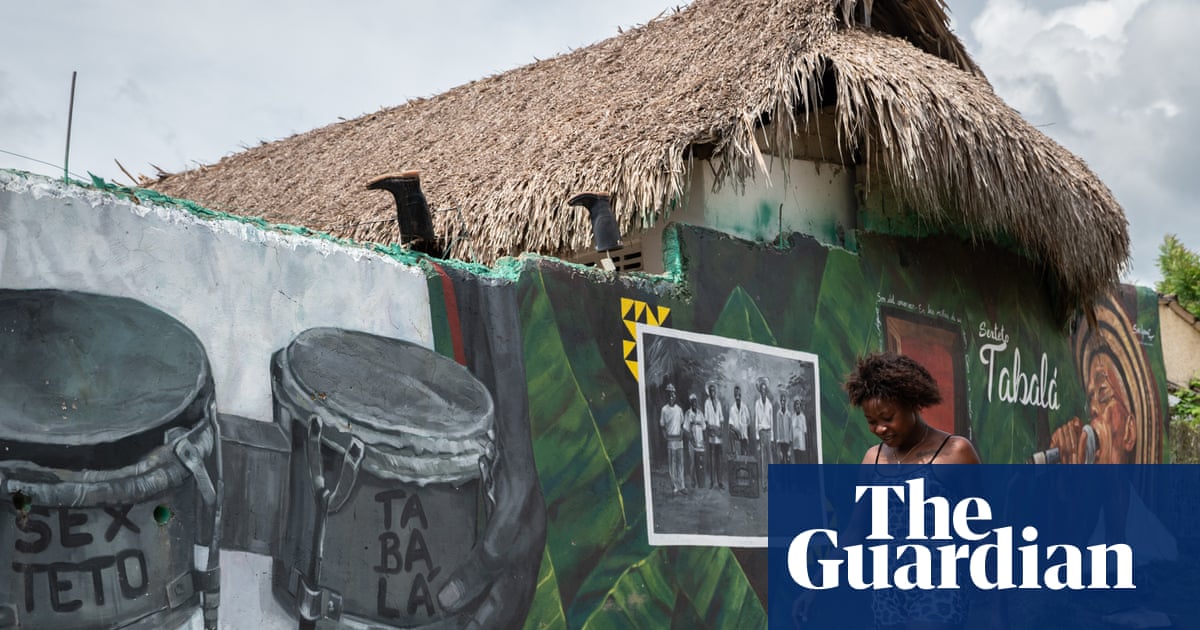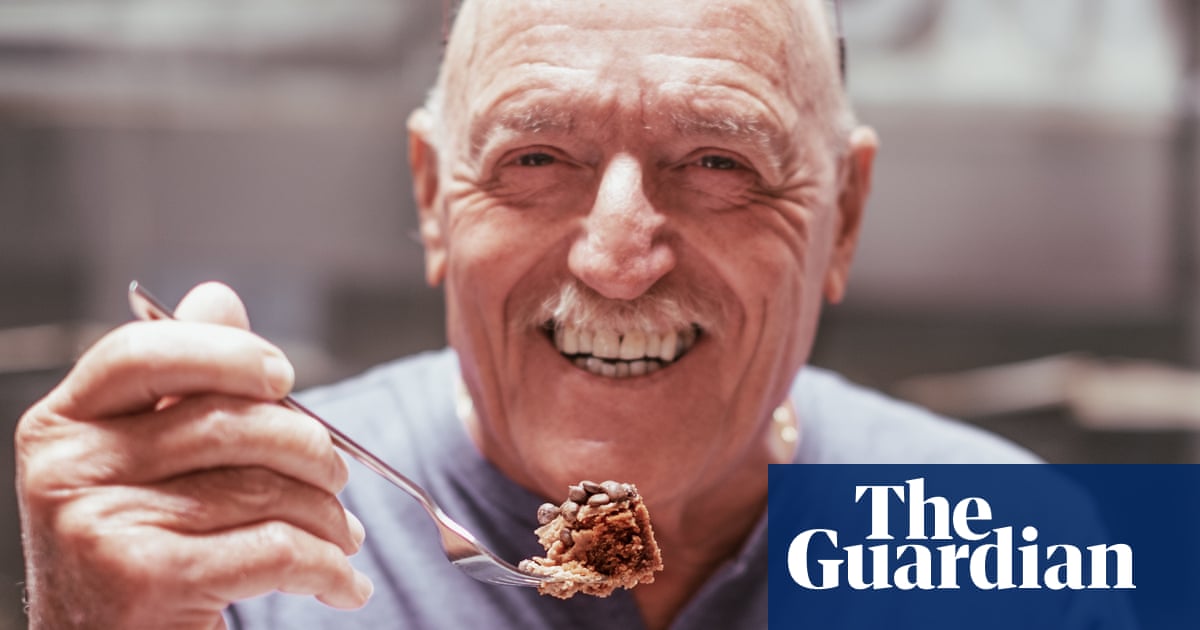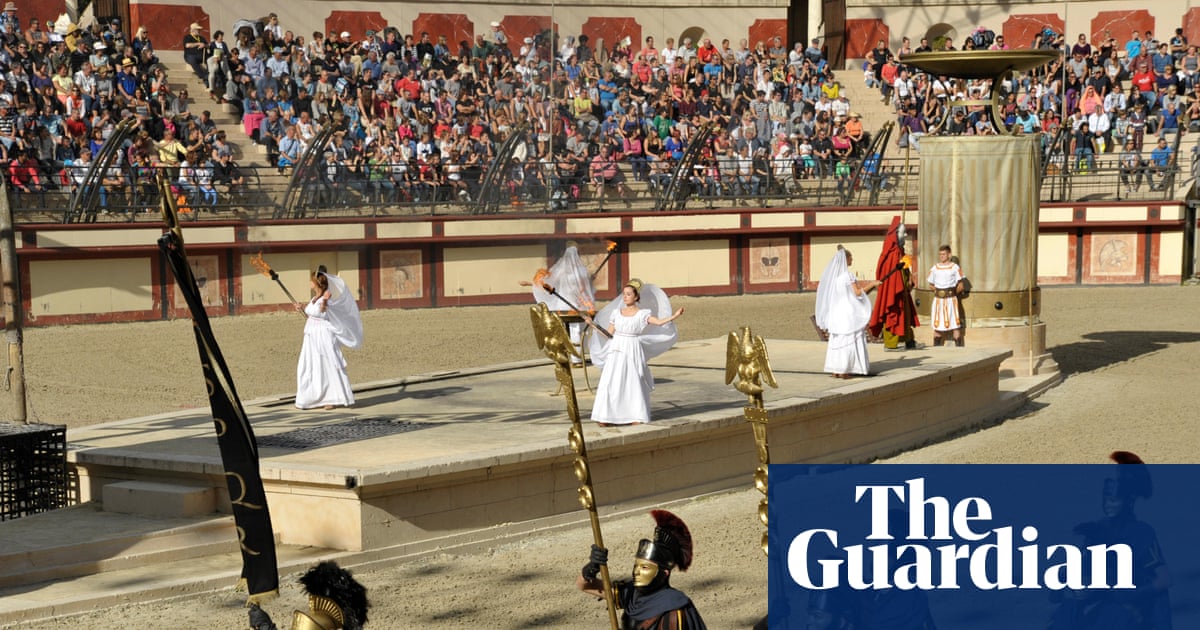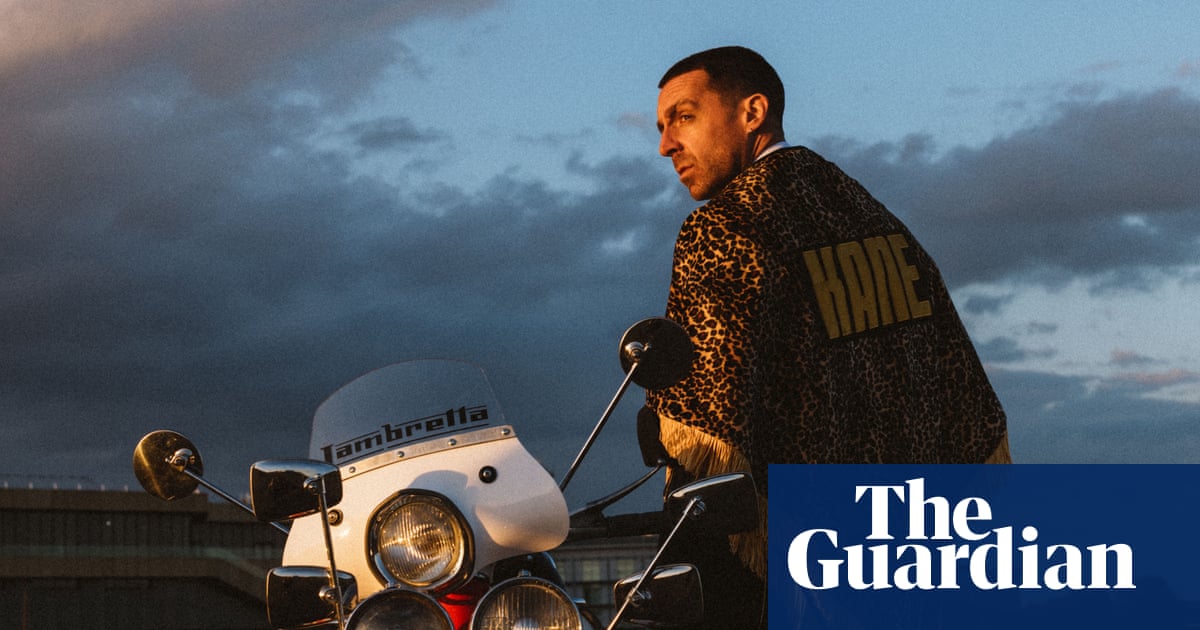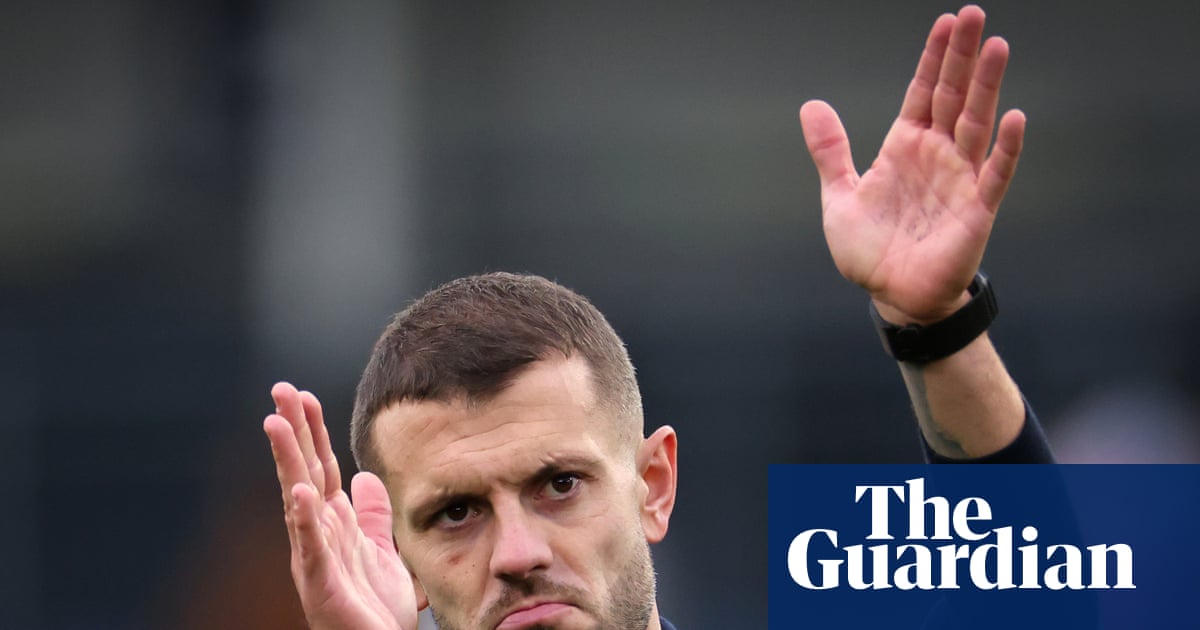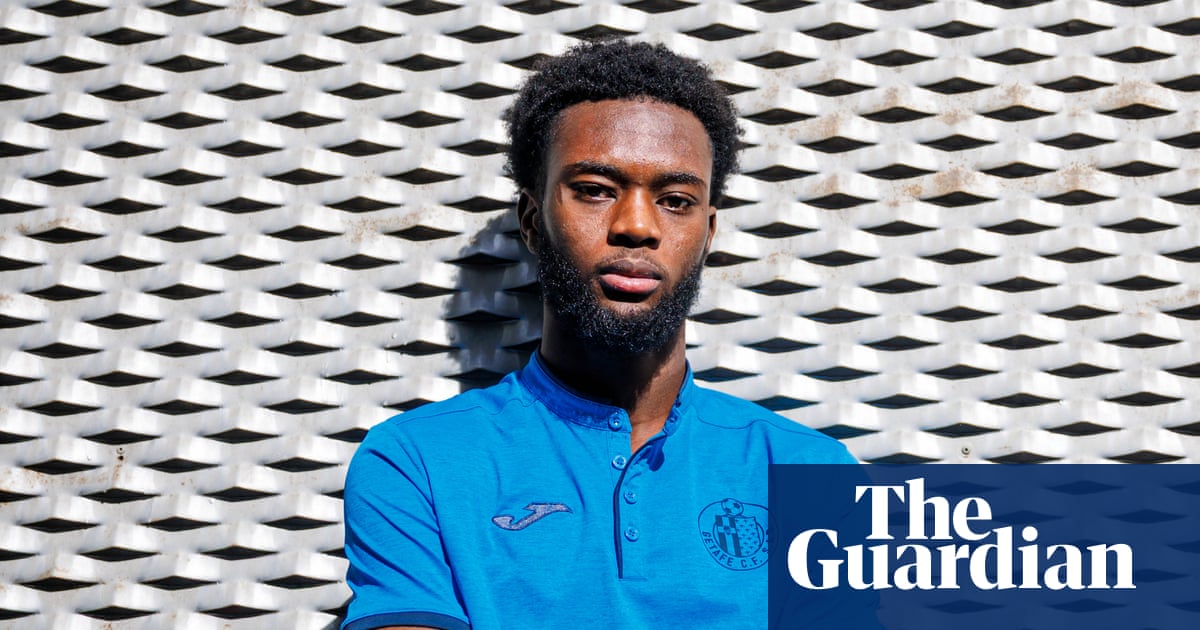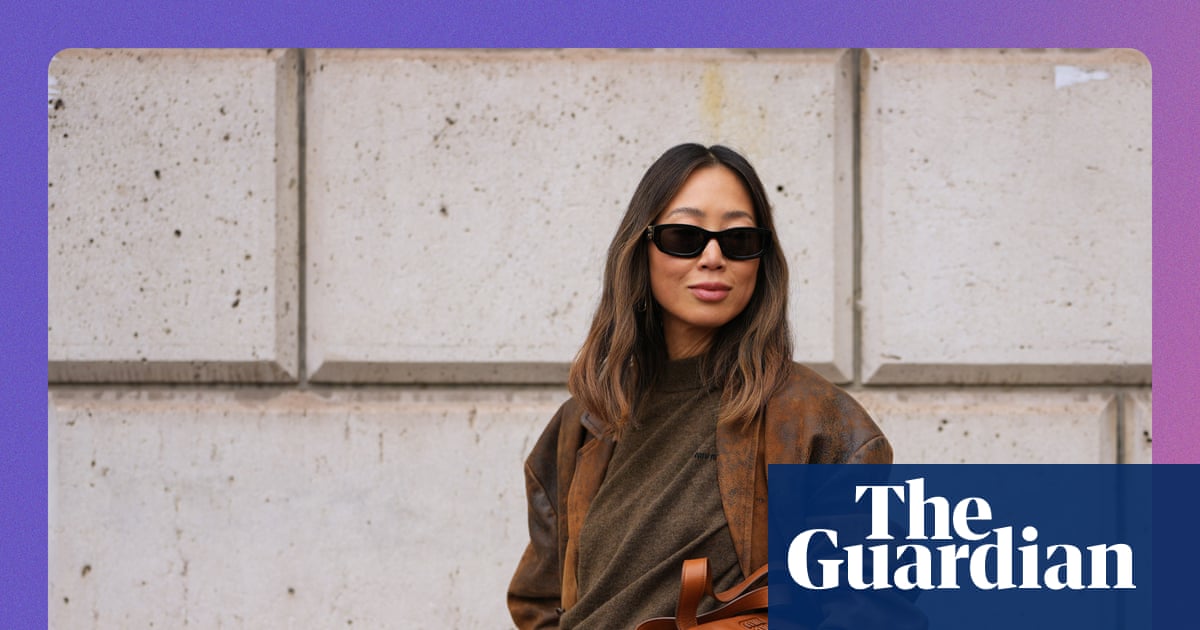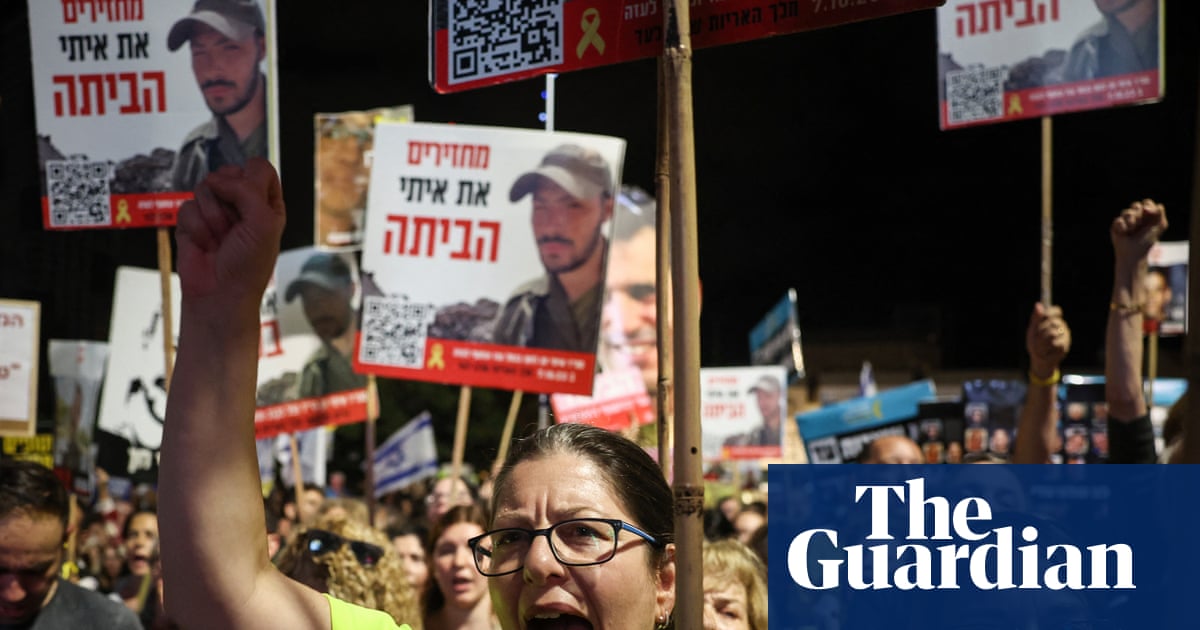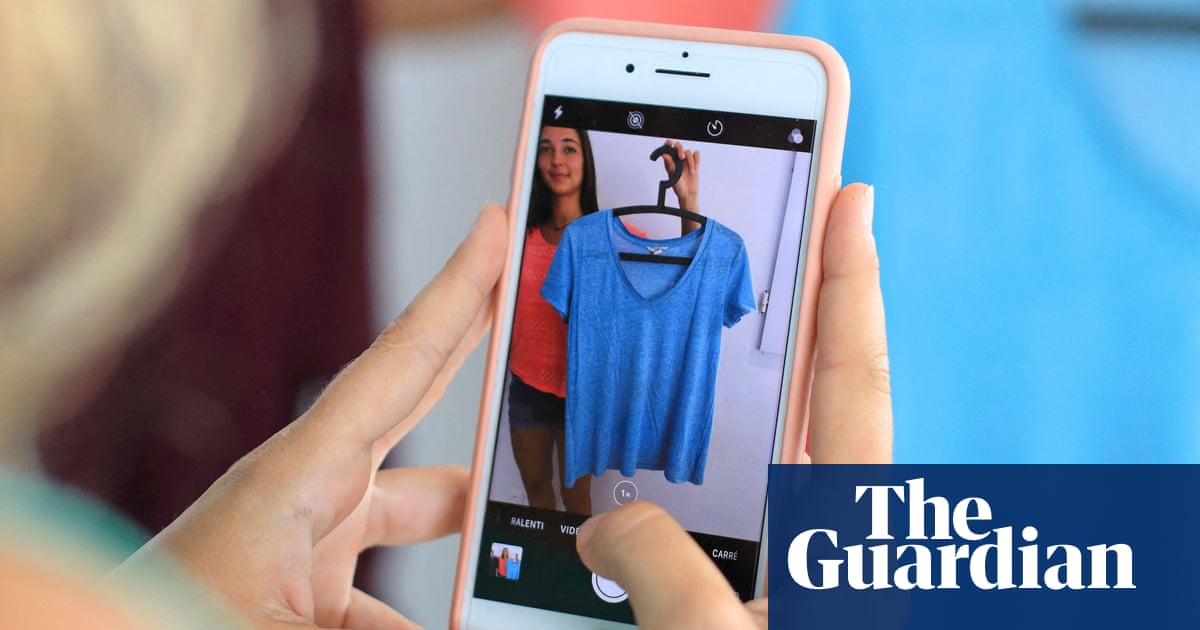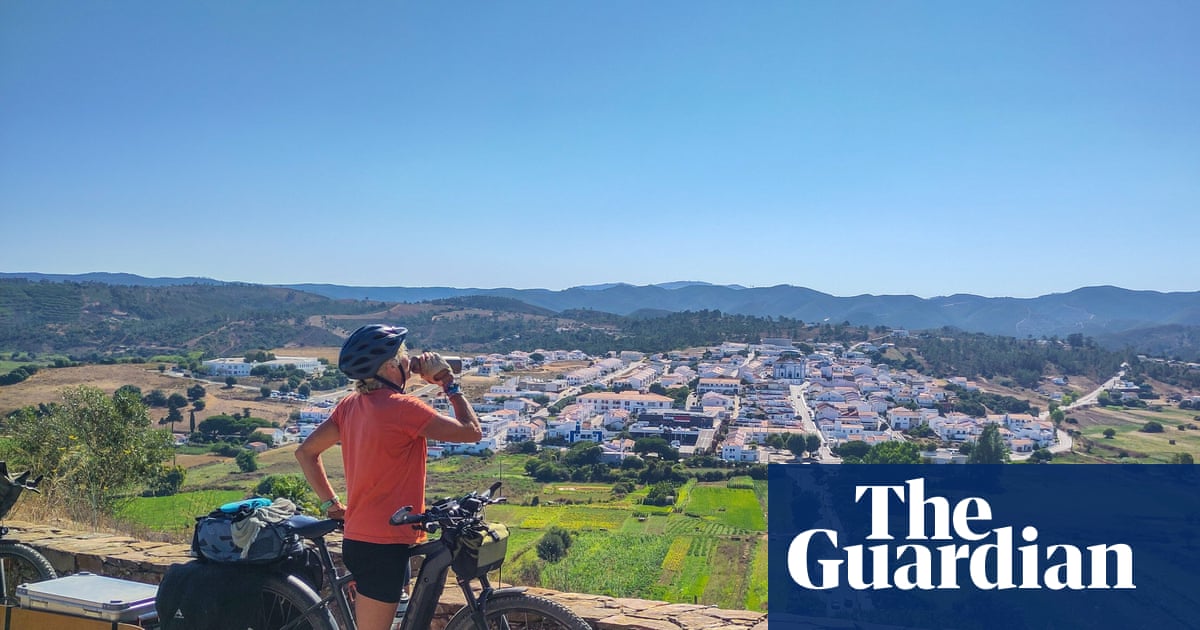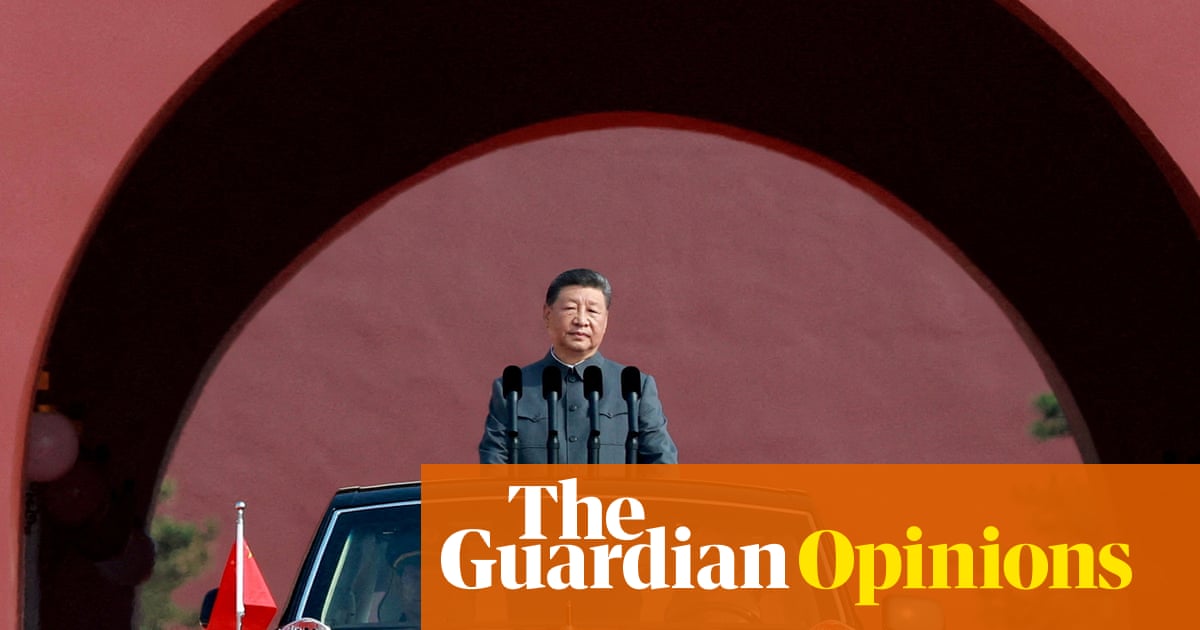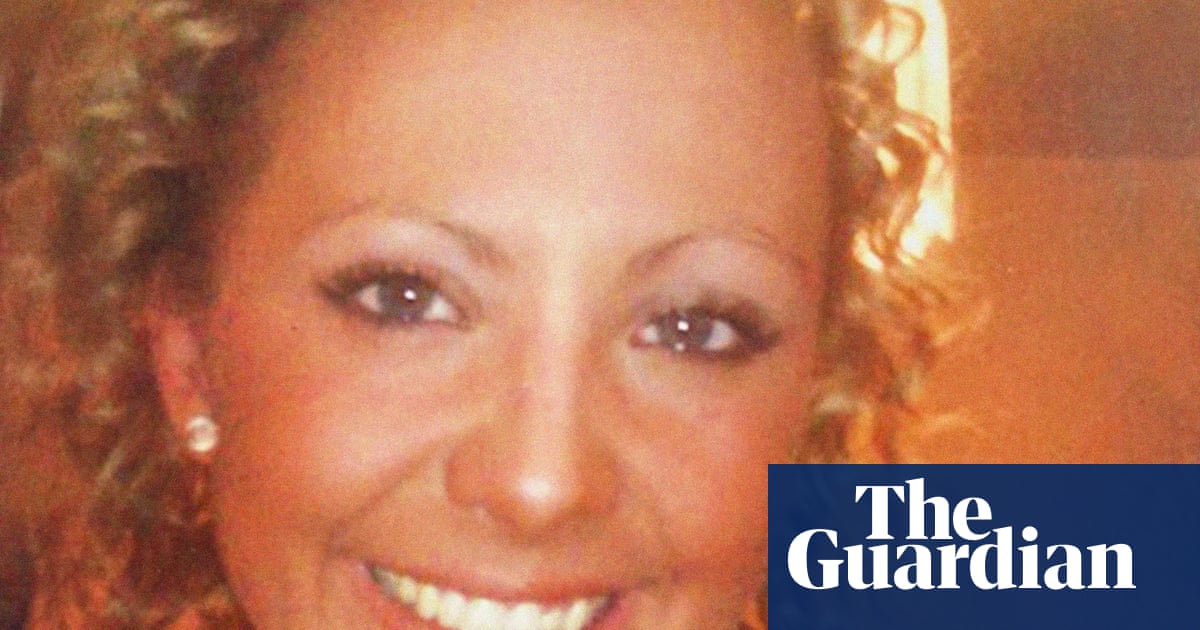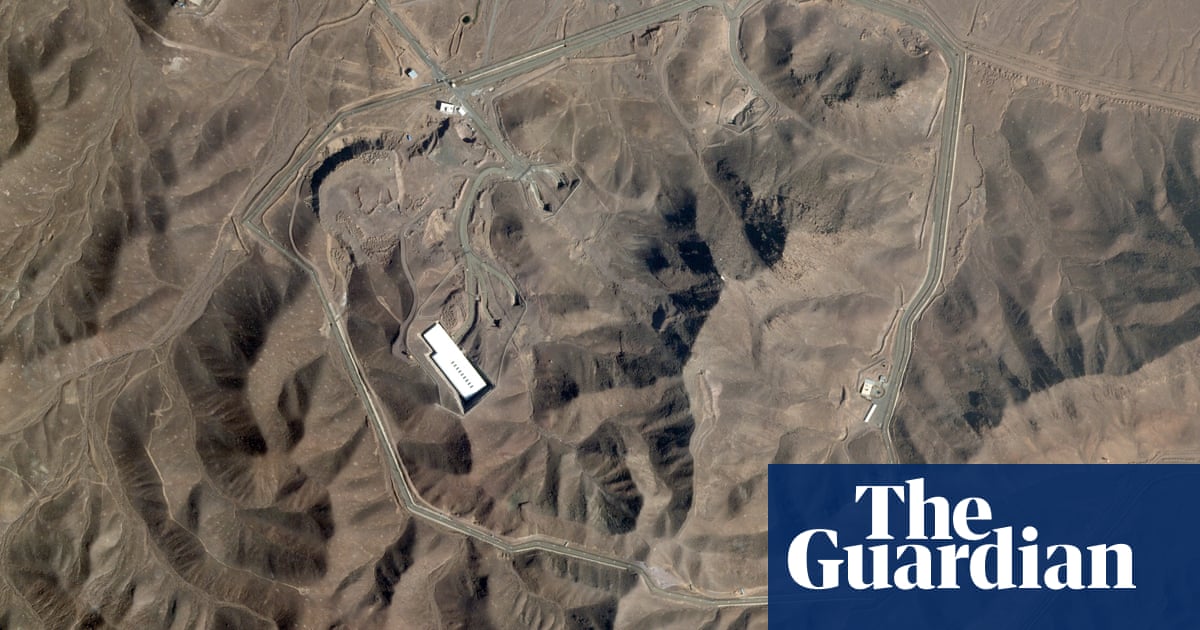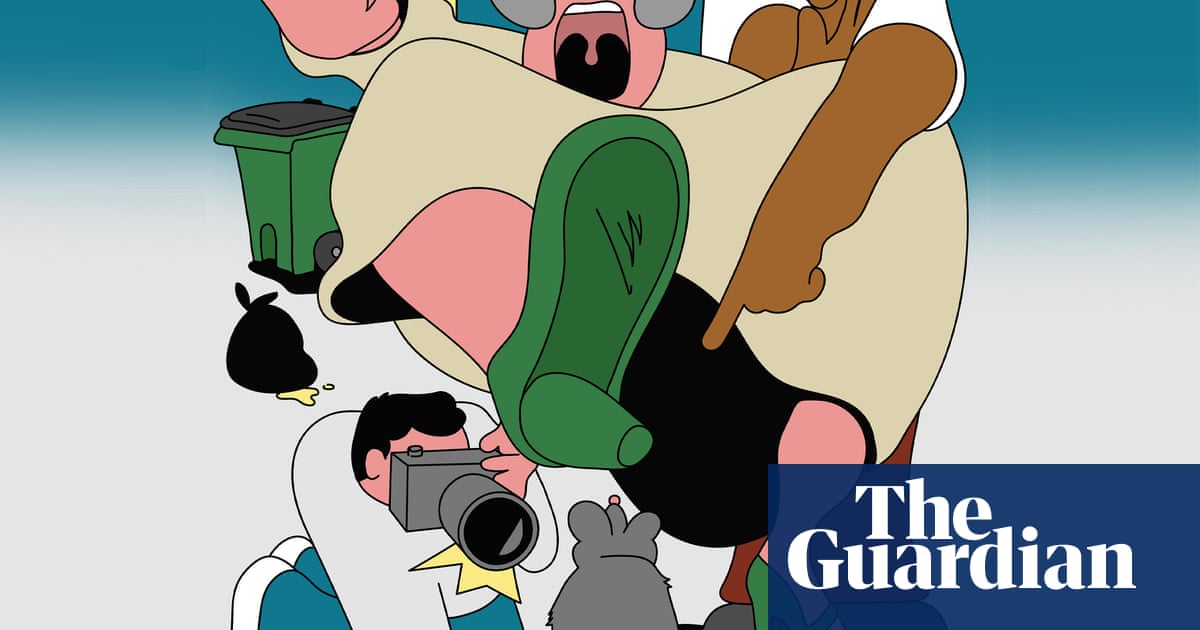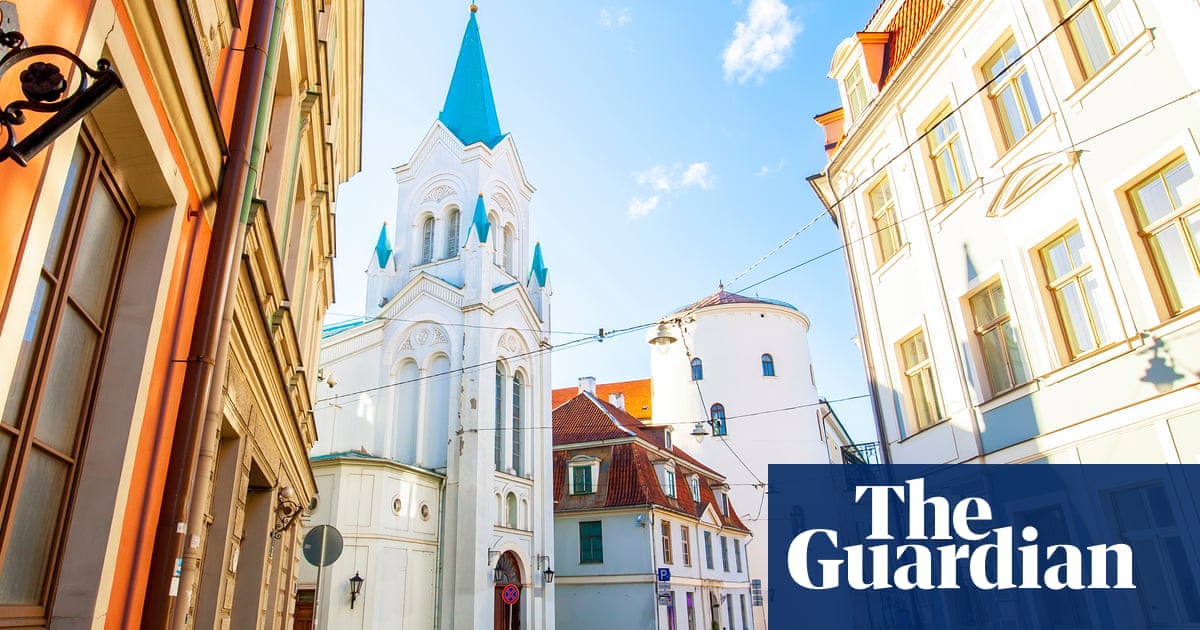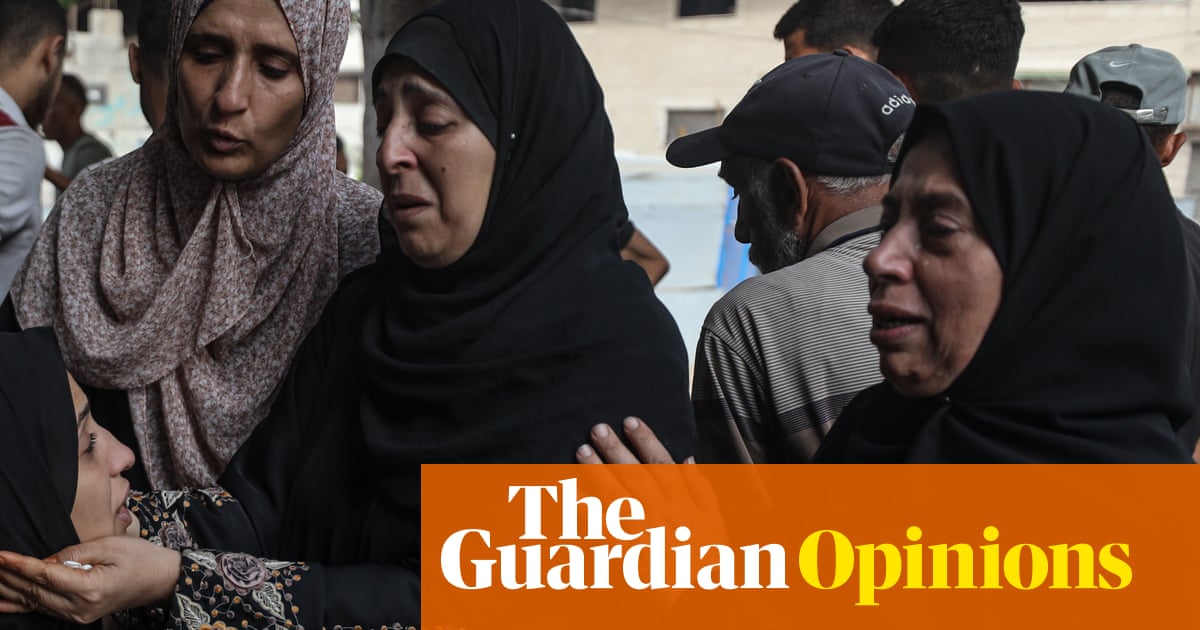Days before we meet, Letitia Wright found herself cheek-by-jowl with a far-right march in London. This is the year when St George’s flags have been displayed in suburban windows and tied to lamp-posts, and when thousands of people – some more intimidating than others, especially to people of colour – have marched on the centre of the capital and beyond. A friend of Wright’s was visiting the city, and they had moseyed down to the South Bank, unaware of what awaited them. “It was jam-packed,” she says, recalling their struggle to get out of the fray. “I was in the middle of it, and then I was out of it. They were doing their thing – and I was doing mine.”
The actor has played refugees twice: once in the BBC Three drama Glasgow Girls, where she portrayed a Somali teenager, Amal, and then in the 2022 film Aisha, where she took on the role of a woman from Nigeria navigating Ireland’s often Kafkaesque immigration system. With this insight – and as a black woman – how does it feel to see far-right rhetoric being spread in the way that it is now? “Sometimes people need to see the humanity behind these things that they assume the worst of, which isn’t true,” she says. “And I’m an immigrant, my parents are immigrants … It’s an interesting conversation. And it’s interesting to see [it unfold] in a country that has done so much to other countries historically …” She was close to the London Eye when she caught sight of the march, but also a rainbow in the sky. “I try and find the peace,” she says, sounding – understandably – a little exhausted by it all.
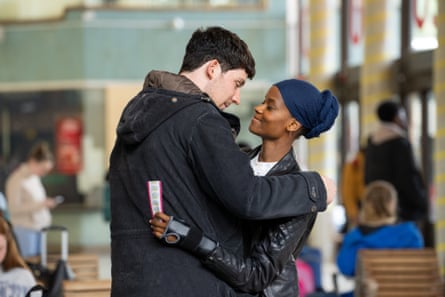
Dwarfed by an oversized hoodie and a mop of black braided locks, the 31-year-old has doe eyes, perfect makeup-free skin and – in contrast to many of the glamorous shots that pop up if you search for her on Google Images – a sort of androgynous cool. For someone who is currently, in her words, “working a night shift” (more on that later), she’s holding up. A few weeks after we meet in east London, Wright will be visiting schools in this same area to speak to students about her directorial debut, Highway to the Moon, a striking short film inspired in part by the blight of knife crime. But today – drowning in her sweatshirt – she looks as if she could be of school age herself.
It’s close to 10am on a Monday morning when we meet; Wright is eating a pot of fruit and offers me one, too. She’s casual, driven (she frequently describes herself as “relentless”), occasionally straight-talking, and often playful (“I crack a lot of stupid jokes,” she tells me). She’s also a bona fide movie star, a stalwart of the Marvel Cinematic Universe who has appeared in four of its superhero epics, including Black Panther in 2018, with another on the way (Avengers Doomsday, due for release at the end of 2026). As tech-savvy princess Shuri, she led Wakanda Forever (2022), the highest-grossing female-led superhero movie in US box office history. For those who had been following her rise, it would probably have come as little surprise: at 21, she starred in Urban Hymn, directed by Michael Caton-Jones, who gave Leonardo DiCaprio his breakout feature film role in 1993’s This Boy’s Life. On the release of Urban Hymn, he said of Wright that he had “not felt like this about someone since Leonardo … my instinct is [that] she can be as big as she wants”. Elsewhere, Wright has – among other things – snagged an Emmy nomination for her role in Black Mirror’s macabre episode Black Museum, and appeared in Steve McQueen’s landmark anthology series Small Axe, as Altheia Jones-LeCointe, the Trinidadian scientist turned British Black Panther.
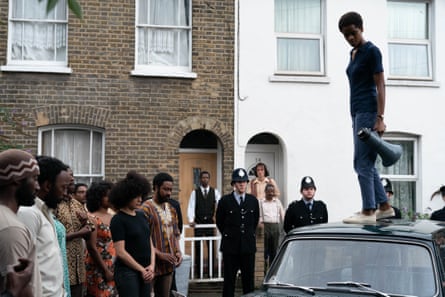
Wright grew up in Tottenham in north London, having moved from small, rainforest-covered Guyana in South America with her parents when she was seven years old. In a world of industry nepo babies, her background is refreshingly normal: teacher mum, a dad who worked in agriculture, and two younger siblings, now 18 and 19. While she is the inspirational big sis, it wasn’t always that way. As a teen, she says, acting was her biggest goal, but she was light on connections and knowhow. Certainly, no one else in her family had attempted anything vaguely similar. “It’s like …” she pauses, looking for the right words. “What the hell?! No one else is passionate? No one’s relentlessly chasing after their dreams?”
Wright had an unconventional route into the industry, sending DIY headshots to agents as a teen until one finally acquiesced and invited her for an audition. “The assistant’s name was something like Emily,” she laughs. “So I was annoying poor Emily, like: here’s me again! Here’s my headshot, here’s my CV!” As well as bagging an agent, she spent some of her teenage years training at the Identity School of Acting, where her classmates included the future Star Wars lead John Boyega. Wright was an extra on his 2011 breakthrough film Attack the Block, about an alien invasion on a London estate. “He’s super talented, and seeing his dreams come true because of the hard work that he put in allowed us also to believe that our dreams could come true,” she says. Boyega is “a big brother” to her.
Wright is now pursuing another dream, as the writer, director and producer of Highway to the Moon. It’s a project she has described as “a love letter to black boys”, and one that reimagines the pastel-hued Arizonan desert as a liminal space. There, teens whose lives have abruptly ended meet one another in a commune and try to make sense of their new reality (the lead character, Micah, arrives still dressed in his school uniform).
It was inspired in part by the death of the model Harry Uzoka, whose murder by fellow model George Koh made headlines in 2018. “I felt really confused. How did a well-known model, a young trailblazer in his industry, get stabbed to death by his friend? It didn’t add up. Usually we are told that these young men are part of a gang, or some other stereotypical explanation for their actions. I immediately began to wonder: why are our black boys hurting each other like this?”
It was also inspired by the death of Wright’s friend’s younger brother, Kwasi Anim-Boadu – known as Junior – in a knife attack in London’s Finsbury Park the same year, and the pain she observed the family go through. “It made an impact,” she explains. “My friend losing her brother and seeing her grieving him was really hard. I just thought about all the family that he left behind, where his spirit was, and the spirit realm. It’s different when you’re seeing these things on the news – when you’re like, that’s over there. But when it’s closer to you, you start looking at it differently.” She wanted, she says, to make a project “that looked at what it means to have unity and love – they have that in ‘the inbetween’. And also what it means to regret not having that here.” It’s important, she says, for young boys to see themselves in a different light. “I want people to see black boys in a way that is not connected to a stereotype, but to take in their emotions, complexities, hopes, dreams, disappointments and fears.” She is also making the film for “other black boys to see themselves as worthy, beautiful and to know that their lives have a meaning. To embrace self-love that will transfer into love for their brother.” She refers to her cast as “her young kings”.
Much care has clearly gone into Highway to the Moon’s futuristic, arresting visuals. Wright had to get special permission to film on the land of the Navajo nations, while her inspirations included the Bahamian artist Tavares Strachan, whose exhibition There Is Light Somewhere brought together black history with space and astrology. Meanwhile, incubating new talent clearly also means a lot to her. She first came across Kenyah Sandy, who plays Micah, in Small Axe (he appeared in the fifth episode, she was in the first), while some other members of the promising young cast came from a New York summer camp where Wright spent a week as a guest teacher. She went on to pay for acting classes for the boys for three months out of her own pocket. “It’s opening up an opportunity for them,” she says, buzzing with excitement. The film sees Micah question his new surroundings, while connecting with other young men who extend positivity to one another and to themselves, uttering lines such as, “I’m destined for greatness” and, “I am my brother’s keeper”. Wright says she was inspired by the affirmations that the boys had said to one another as they huddled around the campfire. Her script is poetic, but impactful; among its lines: “You created wounds, similar to the deep, dark pits on the surface of the moon, into my body.”
The school tour is an important part of the puzzle for Wright. “It’s for them, it’s for young kids, so I’ve always planned that – the most important thing is that kids see it and have these conversations. How does it affect you? How does it inspire you? What did you like about it? What didn’t you like about it? Just bringing it directly to them and praying that it sparks the heart of someone.”
While she hasn’t turned her back on acting, Wright clearly has big aspirations for her career as a producer and director. She has her own production outfit, 3.16, founded in 2020 and named for the Bible verse John 3.16 about Christian salvation. “I wanted to create a nurturing environment for storytellers, and for myself,” she says. “I wanted to just create.” The idea, she says, is to start “very small, very simple, two short films a year”, before building up to feature films. Ultimately, she says she would love to work with other production companies; she’s an admirer of arthouse darlings turned Hollywood heavyweights A24 and Barry Jenkins’ Pastel (Aftersun, Moonlight): “I take a lot of inspiration from them,” she says. “And the boldness of their storytelling.”
Wright has always been an intense actor. I mention her early but memorable role in Russell T Davies’s 2015 series Banana, and its post-watershed companion show Cucumber, about gay life in Manchester, and interwoven stories of love, loss and lust. As a lead in Banana and a recurring character in Cucumber, she played Vivienne “Scotty” Scott, a shy, sheltered young lesbian who develops a sudden, stupendous crush on an older woman she sees in the supermarket, played by Gentleman Jack’s Rosie Cavaliero. “Oh man, I love that character,” Wright says, wistfully. “It’s still one of my favourites today – very quirky, very weird.” Wright was a Bafta Breakthrough Brit in the year that Banana came out; by 2019, she would bag its Rising Star award, and by 2024 she would be on the judging panel.
In 2015, though – and specifically the period after she had filmed Urban Hymn – Wright was close to packing it all in. She had just signed with an agent in LA and was about to start work on a film with Nicole Kidman and Elle Fanning when she found herself suffering from what she would later describe in that Bafta Rising Star speech as “a deep state of depression”. She returned home to London, where she dedicated several months to Bible study. In previous interviews, she has described this period as crucial to the development of her Christian faith, something that she is still committed to today. Did she ever worry about not being able to get back into the industry? “Those questions did come up,” she says, looking thoughtful. “Those questions of: if you do take a break, will you be able to come back to acting? Will you be able to pick things back up? And I think the desire for clarity and the desire for my mental health to be improved outweighed that.”
Back in Hollywood, she auditioned for a new Marvel project, Black Panther, which became the first blockbuster black superhero movie. Ryan Coogler’s film brought home more than $1bn at the box office. When it won three Oscars, Adele and Beyoncé were among the stars partying with Wright at the cast afterparty. “I didn’t realise how big a deal it was until the premiere. I knew we were making something amazing, but when it came out, how it impacted the world … I was really proud of myself, and it made me remember my sacrifices as that 17-, 18-year-old girl.”
It was also the project where she met and became close to the late Chadwick Boseman, whose seemingly sudden death (he had not made his colon cancer diagnosis public) in August 2020 can still feel hard to comprehend. In Wakanda Forever, as the characters mourn King T’Challa, it’s clear they are also mourning Boseman, and the tears that Wright cried were surely for both the actor and his character. His death, she says, is “something we continually try to process and to understand”. She pauses. “It’s a hard thing to talk about. Wakanda Forever was an opportunity to honour my brother that way and continue the thing we started. But it’s one of those questions I’m just going to have to ask God – why did that happen? I know that my brother’s resting and that I’ll see him one day; that gives me a bit of comfort.”
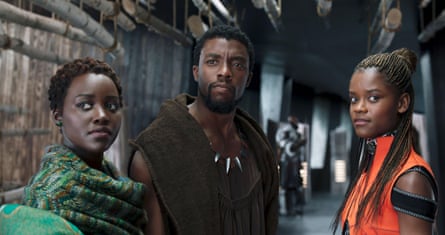
Has her grief changed over time? “It is one of those things … it comes in waves,” she says. “It really depends. Sometimes you can be completely fine and joyous and celebratory, and thinking about everything that he achieved, and sometimes you’re just upset.” Keeping in touch with Boseman’s wife, Taylor Simone Ledward Boseman, is a comfort, and they speak often. It has also taught her a lot, Wright says, about “cherishing people, really cherishing moments. I missed a lot of opportunities when [Boseman] was here doing promotion, and he would say, ‘Let’s have dinner.’ I was like, ‘I’m going to see you on set.’ I thought I’d have for ever, and I didn’t.”
after newsletter promotion
Another difficult period in Wright’s life was to follow. At the end of 2020, she shared a video on X (then Twitter) by a pastor who espoused anti-vaccine and transphobic views. Wright has since staunchly denied endorsing those beliefs; in a 2022 interview with this paper, she said: “Those are things that I am not and I apologised and I’ve moved on.” With the benefit of hindsight, I ask whether she feels she was treated unfairly by the media. She was far from the only celebrity to be linked to content that was critical of the Covid vaccine, but was among those who got the most flak. In 2023, Rolling Stone published a piece with the headline: “Why was Letitia Wright dragged more than Ant-Man star Evangeline Lilly?” I expect Wright to be a little testy, but she is happy to talk about it. “I feel, upon reflection, that as a society we hold each other accountable … It’s about learning from it, which is what I’ve been able to do. Learn from it, and improve as a person.” It must have been pretty awful in the moment? “I learned from it. I grew from it,” Wright repeats. “I had an opportunity, and I took it.”
In 2024, Wright gained her first executive producer feature credit on Sound of Hope: The Story of Possum Trot, a film about a church in East Texas where 22 families adopted 77 children from local foster care. While the Wall Street Journal described it as “a big-hearted film made with a homespun sincerity”, its release was clouded by links between the film’s distributors – the Christian production company Angel Studios – and the right-wing US news site the Daily Wire, something Wright was not made aware of at the time.
Wright said on social media that she did “not condone using this beautiful film for divisive political purposes”. Was it frustrating having to clarify things, and to distance herself?
“Do you work as a freelancer?” she asks me.
Yes, I say.
“So if there’s a particular company that you are working with and they’ve done something that’s not part of the agreement, what would you do?”
Explain that it wasn’t part of the agreement and that I didn’t know about it – so more or less what you did. But was it frustrating to have to do that?
“No, not frustrating at all. It was just a simple procedure … My job was just to bring awareness to something that’s important. If there’s a section or part of a team that doesn’t align, you have to say something. And I did that as gracefully as possible.”
We move on to other subjects. As an actor, producer and now director, Wright has been firmly in the bosom of the industry for some time. And now, in her early 30s, she is thinking about what’s next. “I still want to achieve a lot more,” she says. “But it doesn’t feel so pressing.” As for settling down and having a family: “When it happens, no one will know.” She’s notoriously private – “extremely private”, she clarifies with a laugh. So much so that she won’t even tell me where she lives, other than that it is in east London, but that she’s currently staying south of the river.
For the moment, though, she remains booked and busy. Later that day, she will head over to west London’s Bush theatre for another performance of Not Your Superwoman, the play that is keeping her busy for eight performances a week. It’s a two-hander that also stars Bridgerton’s Golda Rosheuvel, who plays her mother. Its writer, Emma Dennis-Edwards, has described the play as an exploration of “the family dynamics of Caribbean women, the way resilience, humour and strength exist alongside silence, pressure and unspoken struggles”. The goal, Wright says, was to make “something that was a reflection of what we’ve experienced in our life, and that a lot of women can relate to – especially a lot of black women. We have people from all walks of life in the audience. It’s really, really beautiful.”

It’s far from her first rodeo on stage: she has appeared in two plays by her Black Panther co-star Danai Gurira. Next year, she will make her National Theatre debut in Tracey Scott Wilson’s The Story, about “an ambitious black reporter who defies her editor to pursue an incendiary lead”. What does she get from theatre that she perhaps doesn’t from film and TV? “Theatre is the mecca of everything, in terms of how everything has started for us in terms of acting,” she says. “I love all the art forms, but the discipline that comes with theatre is different, and there’s the opportunity to try something new every night.” Occasionally, of course, things go wrong, but by now she’s a master at styling it out. “I have a Guyanese flag I take out of my bag in one scene, and the bag just wouldn’t open one night,” she says, wincing. “Golda was like: all right, let’s get this open. The audience was looking at us, and she just turned around and went: ‘We really need what’s in the bag!’ They were cracking up laughing, and when we finally got it open, the audience just roared.”
The show went on; Wright won’t let anything stop her. I get the sense she hasn’t stopped frantically pushing herself her whole life. “It’s that thing of, ‘just try’,” she says. “You never know what’s on the other side of trying. And many people don’t. I really want to maximise my potential. I do not want to die super full – I want to die empty.”
Highway to the Moon is available to watch on arts platform wepresent.wetransfer.com from 20 October.
Main portrait: Stylist: Rudy Simba Betty. Hair: Stefan Berti. Makeup: Kenneth Soh. Nail artist: Michelle Humphrey. Set design: Lottie Toon. Retouching: Christianah Ebenezer and Laura Cammarata/TST Retouching.

.png) 4 hours ago
3
4 hours ago
3
